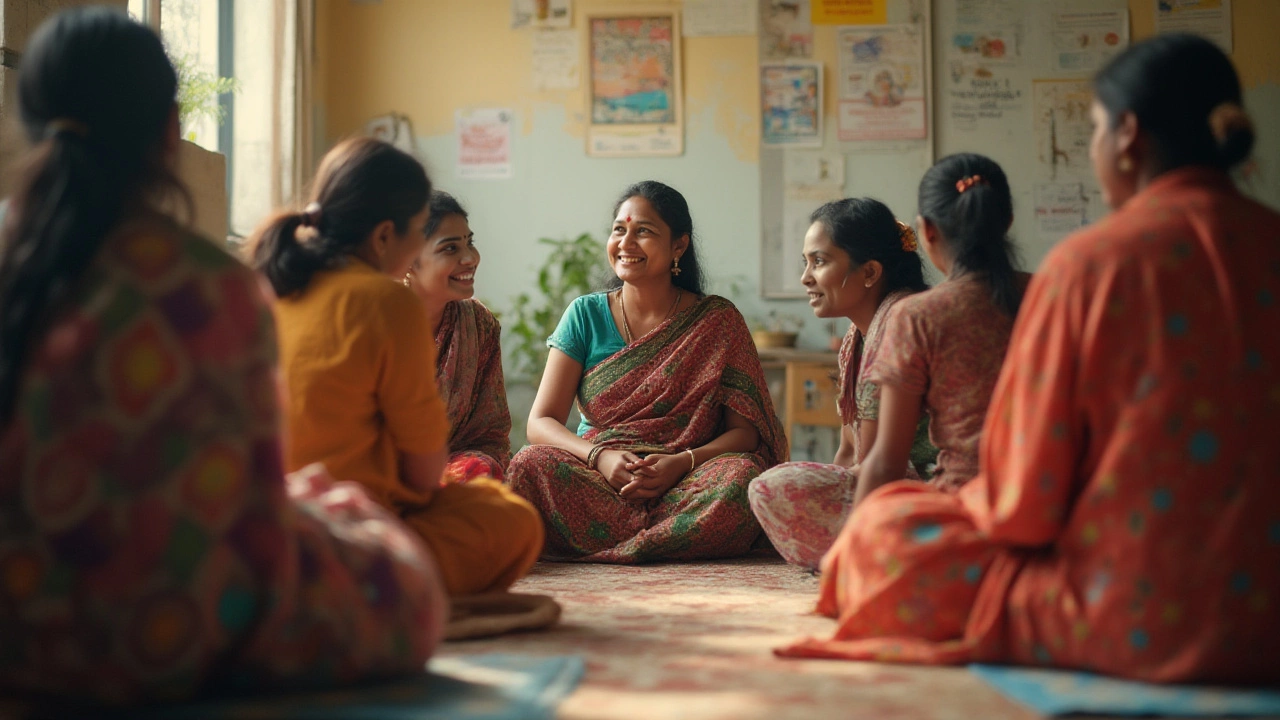You can walk past dozens of people every day and never know what struggles they carry. Hidden behind busy schedules, worries about rent, or the awkwardness of new friendships, a lot of folks crave a safe space to talk it out. That gap? Support groups fill it. The idea isn’t new. Back in the 1930s, Alcoholics Anonymous caught on because people tired of suffering in silence found actual hope by sharing stories, swapping advice, and daring to say, "Yeah, me too." But these groups aren’t just about addiction now. They’re for grief, parenting, medical setbacks, job loss, anxiety—if people can suffer through it, there's probably a group for it.
What Does a Support Group Really Look Like?
Imagine a meeting room, maybe in a church basement or a hospital, or even online these days. Chairs in a circle—no podium, no suit-and-tie leader, just regular people. Someone picks up the conversation, maybe awkwardly at first. "Hi, I’m Mark. I lost my dad last year." Heads nod. A stranger across the room wipes away a tear. That’s a grief support group in action. The setup is always simple: you show up, you listen, you share if you want, nobody’s forced into the spotlight. Most groups set out ground rules, like privacy—what’s said in the room stays there. In Sydney, dozens of local support groups meet every week, from Surry Hills to Parramatta, and the attendance ranges wildly. Sometimes it’s five people; sometimes it’s fifty.
The strength comes from seeing your pain echoed in someone else. A 2022 survey by the Australian Institute of Health and Welfare found that around 36% of Aussies who attended a support group felt less alone and more optimistic about the future. When you hear a stranger say they felt the exact same guilt after losing a pet or the same panic before a big surgery, it’s oddly comforting. The group doesn’t give lectures. They share stories. Hints, tips, raw feelings. Someone might pass around a printout with resources. Someone else might recommend a good book. Then there’s the occasional moment of laughter—a reminder life keeps moving, even during chaos.
Support groups aren’t only about emotions. For diseases like breast cancer, you might join a group organized at the Cancer Council of Australia. It’s not just talking—there’s resource sharing, maybe some knitting therapy, and volunteers who once sat in your chair and now help others. Same goes for parenting groups: you’ll see tired mums comparing tricks to get a toddler to sleep, or teens with ADHD discussing which study app isn’t boring. Flexibility is the heart of it. Some groups run for a fixed number of weeks, others you can dip in and out as you need.
| Type of Support Group | Typical Location | Common Topics |
|---|---|---|
| AA/NA Recovery Group | Community Center/Church | Substance Use, Coping Skills |
| Bereavement Group | Hospital or Online | Loss, Healing, Grief |
| Cancer Peer Group | Hospital/NGO | Treatment Advice, Stress |
| Parent Support Group | School/Online | Child Behavior, Parenting Tips |
You don’t need to have a dramatic story to benefit. Sometimes just being in the room is enough, soaking up normalcy during a tough time. Many groups now meet on Zoom or over WhatsApp, making comfort and confidentiality even easier to find. You might sit wrapped in a blanket at home, coffee mug in hand, and finally blurt out a fear you’ve carried for months. Suddenly, ten faces are nodding at you—in real time or as a group chat ping. That’s where you’ll spot the heartbeat of real support: acceptance that doesn’t demand anything out of you, except showing up.

A Real Example: Alcoholics Anonymous
If you’ve seen TV shows where people sit in circles talking about hitting “rock bottom,” you’ve seen a glimpse of Alcoholics Anonymous (AA). But the power of AA runs deeper than TV clichés. Founded in 1935 in Akron, Ohio, AA is now active in over 180 countries. Sydney has over 450 registered weekly AA meetings—that’s just AA, not including groups for other drugs, gambling, or food struggles. The format is straightforward. No fees, no membership lists. People introduce themselves—"Hi, I’m Jess, and I’m an alcoholic." Sometimes just saying that out loud lifts a huge weight. The person sitting next to Jess has never met her, yet instantly relates via a shared story.
The real ‘magic’ is in the little rituals. There’s a well-thumbed booklet, newcomers nervously sipping on the bad instant coffee, laughter over who brought in the best plate of Tim Tams. Veteran members share milestones—"90 days sober", "first Christmas without a drink"—and the group always claps. Some meetings are “open,” meaning anyone can sit in and learn; others are “closed” for people working through the same struggle. The group has a volunteer chairperson (not a therapist or doctor), so everyone’s on equal footing. It’s about creating a safe space where you won’t get judged, corrected, or told to snap out of it.
The steps are clear without being rigid. AA runs on its famous “Twelve Steps,” which are about self-reflection, admitting struggles, making amends, and supporting others on their way. This step-based approach has been copied by all sorts of groups: Narcotics Anonymous, Gamblers Anonymous, Overeaters Anonymous, even Al-Anon for families of people struggling with addiction. The AA format is proof support groups don’t need to solve your problem for you—sometimes, they just keep you accountable day by day. Studies in the UK and Australia have found that AA participants are 20% more likely to stay sober for a year than people trying to quit cold turkey or with medication alone. The social support makes a real-world difference.
AA isn’t about religion, therapy, or prescriptions. People come from all sorts of backgrounds. There’s retired teachers, baristas, single parents, fresh-out-of-rehab twenty-somethings, and people who used to be high-flying CEOs. That mix is how participants learn new coping skills. Someone might suggest a simple grounding exercise, like counting how long it takes your coffee to cool, just to get through the worst cravings. Another might point out local places with zero alcohol on offer—movie nights, yoga classes, group hikes. Peer-to-peer advice is sometimes worth more than clinical textbooks, because it’s tested in real life.
Confidentiality is non-negotiable. “What you hear here, who you see here, let it stay here.” People want a shield from gossip, from employers, and from family criticism. AA’s anonymity makes it easier for shy folks to open up without worrying their struggles will follow them out the door. There’s no pressure to speak—the group respects personal boundaries. You might just show up, listen, and quietly scribble down the emergency advice.
It isn’t always easy. Relapses happen, awkward silences stretch on, and sometimes people just don’t click. But AA groups are relentless in one way: nobody gets left out for not doing recovery “perfectly.” Support isn’t a one-off moment. It’s constant, even if all anyone can offer is an ear and a mug of tea. That’s a key difference from chatting with friends or reading self-help books alone. Support groups are more like a lifeboat when the personal storm hits, not just a motivational poster on Instagram.

How to Find the Right Support Group for You
Standing on the outside, it’s easy to imagine you’d never fit in—or you’re not ‘sick enough,’ ‘sad enough,’ or ‘broken enough’ to deserve help. It’s total rubbish. Support groups run the full range from super-specialized (think: young women under thirty, newly diagnosed with Multiple Sclerosis) to catch-all, like groups for the recently unemployed. In Sydney, you can find support groups through hospital flyers, community centers, or websites like SANE Australia and Beyond Blue. Many support groups are moving online, especially after the COVID-19 shake-up. Don’t rule out chatting to your GP or a trusted social worker for an introduction—they usually know where to send you if you need something local and quiet.
But how do you know if a group’s right for you? Here’s a shortlist to make it easier:
- Check if the group is peer-led or run by professionals. Both have pros and cons. Peer-led groups focus on lived experiences and tend to feel more forgiving; professional groups can offer structured coping tools and crisis management.
- Gauge the size. Smaller groups are less intimidating, but big groups have more perspectives. If you hate crowds, look for intimate, invite-only circles.
- Ask how private it is. Some groups allow observers or note-takers; others lock the doors both literally and metaphorically. Make sure you know the privacy policy.
- Watch out for “fix-it” cultures. Real support groups respect your pace. If people push solutions or get bossy, that’s a red flag.
- Test the group gently. It's perfectly normal to try a few before settling. Most let you drop in as many times as needed before you choose.
- Think about timing and location. Will you realistically make the meetings? Online versions can fit hectic schedules.
Your reason for joining doesn’t have to be earth-shattering. Maybe you just want to swap stories with other single dads, or hear from people who’ve managed panic attacks on public transport. Some groups meet for twelve-week cycles, while others go on indefinitely. You’ll pick up survival tips: breathing exercises, how to explain your condition to family, what legal or financial help exists for your situation. Group members share everything from meal hacks for chemo patients to book recommendations for kids grieving a parent.
If you’re nervous, a good tip is to sign up for a virtual group first. Video meetings can be less intimidating than walking into a circle of strangers—plus, you can log off if it’s too much. Look for reviews or comments on hospital notice boards, Facebook, or Reddit. People are honest about what helped and what didn’t. No group is one-size-fits-all. But once you find the right crew, the relief is almost physical—a weight lifted, a breath you didn’t know you were holding finally exhaled. The right support group feels like home on days when home feels too far out of reach.
Support groups keep evolving. Some offer potlucks, yoga classes, guided journaling, or art therapy. You might attend mourning picnics, gaming nights, or join group chats that share memes at 2 a.m. The heart of the thing isn’t activities—it’s the unspoken rule: you’re welcome, whatever you’re carrying. If you’re considering making the leap, you’re already halfway there. No need to be perfect, ready, or strong. Just show up—someone will always make space for your story.
